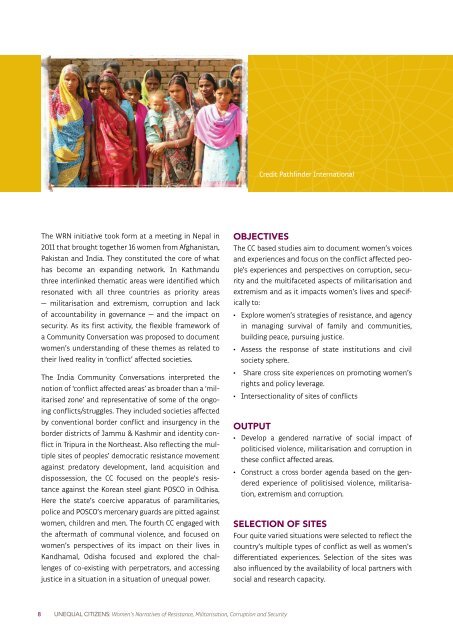CC_India
CC_India
CC_India
Create successful ePaper yourself
Turn your PDF publications into a flip-book with our unique Google optimized e-Paper software.
Credit Pathfinder International<br />
The WRN initiative took form at a meeting in Nepal in<br />
2011 that brought together 16 women from Afghanistan,<br />
Pakistan and <strong>India</strong>. They constituted the core of what<br />
has become an expanding network. In Kathmandu<br />
three interlinked thematic areas were identified which<br />
resonated with all three countries as priority areas<br />
— militarisation and extremism, corruption and lack<br />
of accountability in governance — and the impact on<br />
security. As its first activity, the flexible framework of<br />
a Community Conversation was proposed to document<br />
women’s understanding of these themes as related to<br />
their lived reality in ‘conflict’ affected societies.<br />
The <strong>India</strong> Community Conversations interpreted the<br />
notion of ‘conflict affected areas’ as broader than a ‘militarised<br />
zone’ and representative of some of the ongoing<br />
conflicts/struggles. They included societies affected<br />
by conventional border conflict and insurgency in the<br />
border districts of Jammu & Kashmir and identity conflict<br />
in Tripura in the Northeast. Also reflecting the multiple<br />
sites of peoples’ democratic resistance movement<br />
against predatory development, land acquisition and<br />
dispossession, the <strong>CC</strong> focused on the people’s resistance<br />
against the Korean steel giant POSCO in Odhisa.<br />
Here the state’s coercive apparatus of paramilitaries,<br />
police and POSCO’s mercenary guards are pitted against<br />
women, children and men. The fourth <strong>CC</strong> engaged with<br />
the aftermath of communal violence, and focused on<br />
women’s perspectives of its impact on their lives in<br />
Kandhamal, Odisha focused and explored the challenges<br />
of co-existing with perpetrators, and accessing<br />
justice in a situation in a situation of unequal power.<br />
OBJECTIVES<br />
The <strong>CC</strong> based studies aim to document women’s voices<br />
and experiences and focus on the conflict affected people’s<br />
experiences and perspectives on corruption, security<br />
and the multifaceted aspects of militarisation and<br />
extremism and as it impacts women’s lives and specifically<br />
to:<br />
• Explore women’s strategies of resistance, and agency<br />
in managing survival of family and communities,<br />
building peace, pursuing justice.<br />
• Assess the response of state institutions and civil<br />
society sphere.<br />
• Share cross site experiences on promoting women’s<br />
rights and policy leverage.<br />
• Intersectionality of sites of conflicts<br />
OUTPUT<br />
• Develop a gendered narrative of social impact of<br />
politicised violence, militarisation and corruption in<br />
these conflict affected areas.<br />
• Construct a cross border agenda based on the gendered<br />
experience of politisised violence, militarisation,<br />
extremism and corruption.<br />
SELECTION OF SITES<br />
Four quite varied situations were selected to reflect the<br />
country’s multiple types of conflict as well as women’s<br />
differentiated experiences. Selection of the sites was<br />
also influenced by the availability of local partners with<br />
social and research capacity.<br />
8 UNEQUAL CITIZENS: Women’s Narratives of Resistance, Militarisation, Corruption and Security


